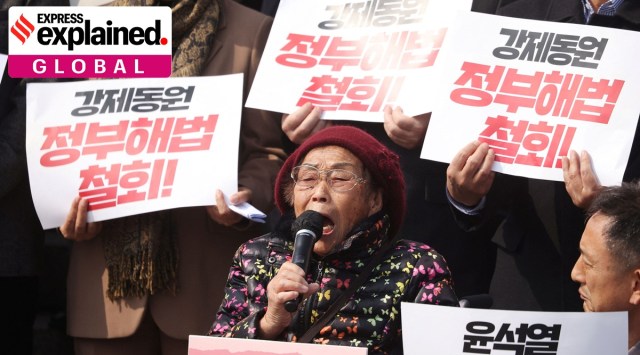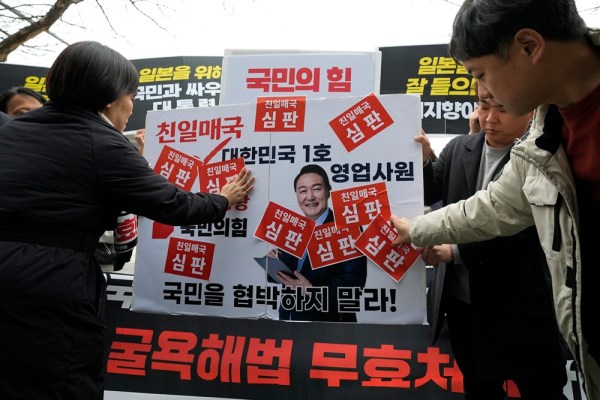Why South Korea’s plan for compensating victims of Japan’s forced labour is drawing criticism
During Japan’s colonisation of Korea from 1910-1945, around 1,50,000 Koreans were forced to work in factories in Japan and thousands of Korean women were forced into sexual slavery. The issues have remained contentious between the countries.
 Yang Geum-deok, a survivor of forced labour under Japan's occupation, speaks during a protest in Seoul, March 7. The banners read "Yoon Suk Yoel's humiliating diplomacy is OUT!" and “withdraw government solution for victims of forced labour under Japan's 1910-1945 colonial occupation”. (REUTERS/Kim Hong-Ji)
Yang Geum-deok, a survivor of forced labour under Japan's occupation, speaks during a protest in Seoul, March 7. The banners read "Yoon Suk Yoel's humiliating diplomacy is OUT!" and “withdraw government solution for victims of forced labour under Japan's 1910-1945 colonial occupation”. (REUTERS/Kim Hong-Ji) This week, in an attempt to mend diplomatic relations, South Korea announced a plan to compensate Korean nationals who had been compelled to engage in forced labour during Japan’s colonial rule of the country, a move that has come under harsh criticism domestically.
Under this plan formed by South Korea’s President Yoon Suk Yeol’s government, Seoul would compensate former forced labourers through an existing public foundation. South Korean private-sector companies would fund it, rather than the South Korean government seeking payments from Japan, a Reuters report said.
During Japan’s colonisation of the Korean Peninsula from 1910-1945, approximately 1,50,000 Koreans were forced to work in factories and mines in Japan during the Second World War.
Thousands of Korean girls and women were also forced into sexual slavery in military brothels – historical occurrences which have remained points of contention between the two countries since they formally established diplomatic relations in 1965.
What is the disagreement between Japan and South Korea?
The Yoon government in South Korea has been pushing to improve ties with its neighbour and improve security cooperation because of shared interests in the region – both the countries are US allies – along with concerns about potential threats from North Korea.
This recent plan by the Yoon government is a marked shift from the stance of previous governments, who had attempted to get Tokyo to financially compensate the victims.
But the case is complex. Several victims of forced labour and sexual slavery are dead, and many of those surviving are in their 90s. A 2018 ruling by South Korea’s top court had ordered two Japanese companies, Nippon Steel and Mitsubishi Heavy Industries, to compensate the 15 surviving victims of forced labour but the companies refused, creating even more animosity. As of 2023, only three victims are still alive.
 Protesters attach stickers on an image of South Korean President Yoon Suk Yeol during a rally in Goyang, South Korea, March 8, 2023. The signs read “A pro-Japanese traitor.” (AP Photo/Ahn Young-joon)
Protesters attach stickers on an image of South Korean President Yoon Suk Yeol during a rally in Goyang, South Korea, March 8, 2023. The signs read “A pro-Japanese traitor.” (AP Photo/Ahn Young-joon)
One bone of contention is the 1965 Seoul-Tokyo treaty that eventually normalised diplomatic relations between the two countries, under which millions of dollars of economic aid was given by Tokyo to Seoul. Japan has consistently claimed that under this treaty all wartime compensation has been settled – a stance that previous South Korean governments, survivors, their families and activists have disputed.
Following the South Korean court’s ruling, Japan retaliated in 2019 by placing export controls on chemicals that were vital to South Korea’s semiconductor industry, according to an Associated Press report.
Back then, South Korea’s President Moon Jae-in had accused Japan of weaponizing trade and had threatened to terminate a military intelligence-sharing agreement with Japan, which had been a symbol of their three-way security cooperation with the US.
And what is the present scenario?
Needless to say, the US has been quick to welcome President Yoon Suk Yeol’s government’s move because it creates possibilities for enhanced security cooperation that had been hitting a roadblock due to these unresolved disputes between Tokyo and Seoul. US President Joe Biden was quick to hail the development as “a groundbreaking new chapter”, keeping Washington’s interests in mind.
Under the plan proposed by the Yoon government, South Korean companies that benefited from a 1965 post-war treaty will pay donations to an existing public foundation. The fund of $3m will be distributed among the families of 15 original plaintiffs. Of the plaintiffs, only three are alive and they have said they will not accept the money. The survivors have demanded direct compensation from the Japanese companies and a fresh apology from the Japanese government, a BBC report said.
- 01
- 02
- 03
- 04
- 05






































